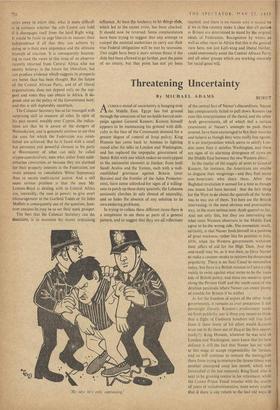The Centre Can Hold
ALIBERAL among rampant conservatives is, constantly faced with a difficult choice : he can • assert his liberalism, at the cost of losing contact with and influence over them; or he can mute it, in the hope of converting them by his example. But when conservatism begins to move to the Right, there quickly comes a point when to stay with them in the pretended hope of con- verts becomes disreputable; remaining, he will do too much violence to his conscience. This is the position in which liberals in the Central African Federation find themselves today. Many of them were supporters of the Welensky or Whitehead regimes as long as they could be—too long, often, for their own peace of mind. Even now, some of them are still reluctant to leave, knowing that every liberal defection strengthens extremist in- fluence within the administration. But recent events have demonstrated all to clearly that the ideal of a multi-racial society which the Federa- tion was designed to bring about cannot be achieved under the present Federal rulers; and a liberal has no choice but to renounce them.
It is easy enough for a writer several thousand
miles away to assert this; what is more difficult is to estimate whether the soft Centre can hold if it disengages itself from the hard Right wing. It would be futile to urge liberals to reassert their independence if all that they can achieve by doing so is their own impotence and the ultimate triumph of reaction. It is consequently hearten- ing to read the views in this issue of an observer recently returned from Central Africa who not merely believes in the future for liberalism, bUt can produce evidence which suggests its prospects are better than has been thought. But the future of the Central African Party, and of all liberal organisations, does not depend only on the sup- port and votes they can obtain in Africa. It de- pends also on the policy of the Government here; and this is still deplorably uncertain. .
The Colonial Secretary has so far managed with surprising skill to reassure all sides. In spite of his past record, notably over Cyprus, the indica- tions are that he is aware of the dangers of Welenskyism, and is genuinely anxious to see that the aims for which the Federation was estab- lished are achieved. But he is faced with a small but persistent and powerful element in his party at Westminster of what can only be called crypto-apartheid-ers; men who, either from auth- oritarian Conviction, or because they are alarmed for their property interests in the Federation, are more anxious to consolidate White Supremacy than to secure multi-racial justice. And a still more serious problem is that the men Mr. Lennox-Boyd is dealing with in Central Africa are, inevitably, the men in power; to give overt encouragement to the Garfield Todds•or Sir John Moffats is consequently out of the question, how- ever anxious he may be to see their work prosper.
The best that the Colonial Secretary can do, therefore, is to maintain his recent restraining
'He says he's only canvassing.'
influence. At least the tendency to let things slide, which led to the recent crisis, has been checked. It should now be reversed. Some commentators have been trying to suggest that any attempt to compel the national authorities to carry out their true Federal obligations will be met by secession. This might have been a more serious threat if the slide had been allowed to go farther, past the point of no return; but that point has not yet been reached, and there is no reason why it snow(' be if we in this country make it clear that all parties in Britain are determined to stand by the original ideals of Federation. Recognition by whites as well as other races in Africa that this is the general view here, not just Left-wing and liberal blether, could enormously assist the Central African Party and all other groups which are working sincerely for racial good will.







































 Previous page
Previous page